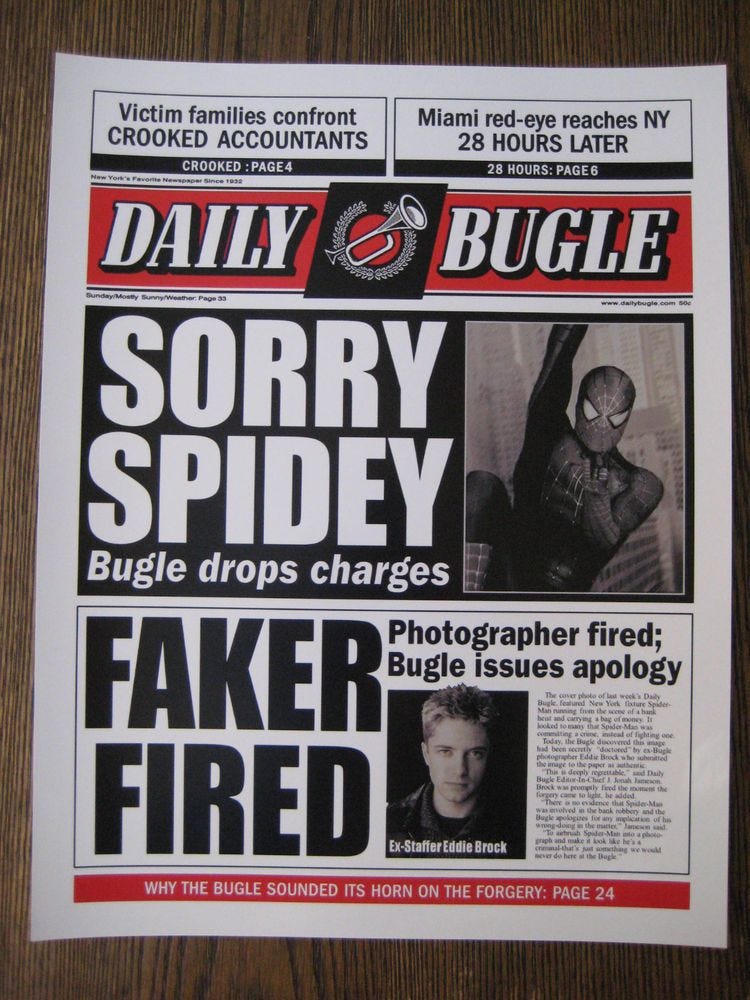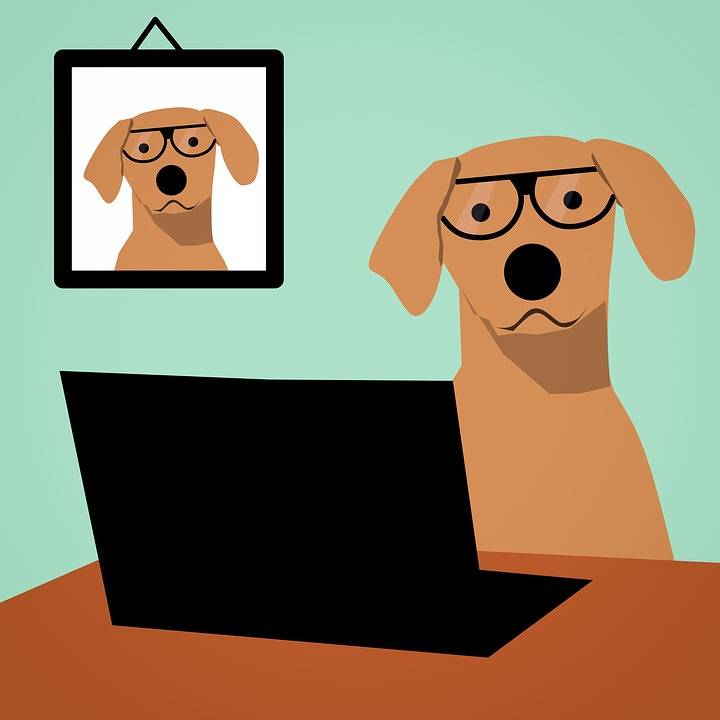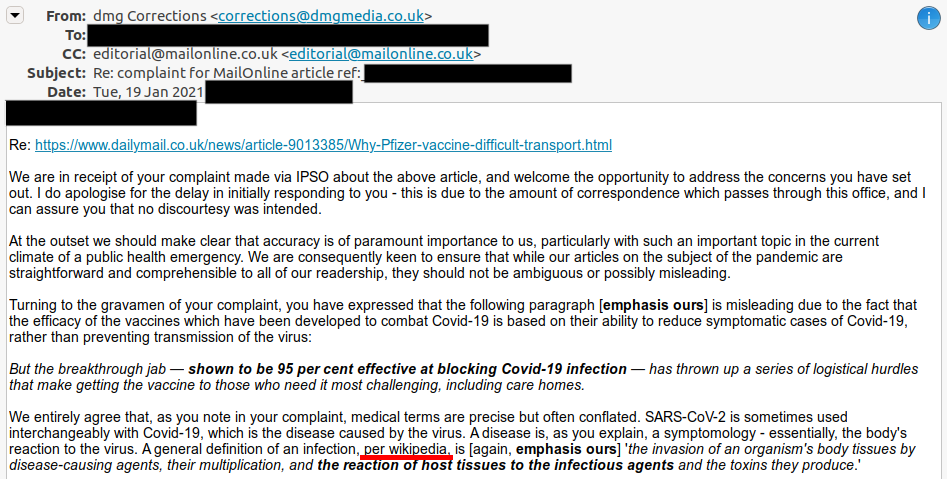Underdog Makes A Mistake: How Media Outlets "Fact Check" Themselves
Get in Underdog, we're about to issue some corrections
I opened the floor yesterday to a discussion article asking if Children’s Health Defense were controlled opposition, based on a FOIA’d Fauci email I had misread. I had read it as being related to ‘Children’s Health Defense’, but it actually says ‘Children’s Defense Fund’. Big Oops.
Despite having re-read the article prior to publication for typographical and formatting errors, I had a psychological block on the wording, so mentally I could not see my own mistake despite how painfully obvious it was to everyone who wasn’t me. I attribute it to a type of change blindness triggered by reading too much information, namely fluffers fluffing Fauci. The error was 100% my own.
Within 2 minutes eagle-eyed commenter - Rhubarbgal - had spotted my mistake and queried. Because The Daily Beagle is not an ivory tower of rampant censorship with insulated worldviews, within 5 minutes I was writing a correction notice to the top of the page, updating the title, and appending to the end tag lines, whilst apologising in the comments. I did not withdraw the article as I have no intention of hiding my mistake. It will forever tarnish my record.
Publish A Correction Notice?
Another commentator asked if I’d publish a separate newsletter with a correction notice; I replied I hadn’t as subscribers often unsubscribe if they receive too many emails (regardless of type or quality). I used to publish two articles a day previously and crashed to 11 views. [Edit: Example of this article triggering exactly that below].
I said I’d piggyback the correction notice onto a conventional article (that way, it is one less email and you get something to read besides me grovelling again).
How do you avoid such mistakes as a sole publisher? Truth is, you can’t. It is why The Daily Beagle already had a corrections policy setup several months back. It is not a case of ‘if’ but ‘when’ in journalism. The only difference is in how you handle it.
Most major publishers will bury their corrections notice at the bottom of a page in tiny italic text, or even in a separate subsection of the website altogether dedicated to corrections that isn’t visible from the main page.

Some might write small italic text and bury it halfway through. If you’re lucky, some might publish a small italic byline at the top. In my case I wrote an entire paragraph in bold at the top, as I didn’t want people to miss my mistake. You can’t unpublish or correct emails, however. One of the downsides of Substack.
Issues With Correcting Big Publishers
Having made several publishers correct mistakes in the past myself, their lack of transparency and upfrontness about the matter always frustrated me. I always felt it should be subject to standardisation in law requiring they make it at least visible on the front page with an equal or greater visibility than the original article.
Essentially they deceive the audience who already read the article, then retroactively issue the correction the audience will then never see (who is ever going to re-read a several month old article?).
I spent two months fighting the MailOnline (part of the Daily Mail group) over a lie they published in an article saying the Pfizer shot could prevent spread - the bastards tried to quote Wikipedia of all things as their source on medicine in rebuttal. Meanwhile I quoted Johns Hopkins, the BMJ and a government cancer website.
The article in dispute had dropped off the front page long by then. The forced correction proved rather prescient recently in light of Pfizer admitting they hadn’t proven it prevents transmission. The fact is, they never did. Weasel wording that laundered public misunderstanding between disease (symptoms) and infection (virus) done by media outlets sold the unevidenced claim.
The lack of evidence and pedantic wordplay of conflating symptoms with infection in studies was always there (note the date in the email). Many people were psychologically blind to it, as it required lawyer-like pedantic understanding of medical terms not even medical professionals typically used. You don’t arm wrestle a giant publication under the table as an individual unless your facts are spot-on.
MailOnline only changed one word in the correction. They dropped the word “infection”. I took the liberty of keeping a before and after archive copy so the public could review the differences. Notice the absence of a correction notice? You wouldn’t have even known there was a grave mistake unless I told you.
Could I Have Done Better Than The Daily Mail?
Could I have prevented the ‘Children’s Defense Fund’ error if I asked someone else to review my work prior to publication? Not really. If I know or ask anyone personally they have an immediate conflict of interest in my work.
Friends don’t like to criticise friends. Paid employees don’t want to upset you lest they lose their job (not that I can afford to hire anyone). Confidantes may overtrust your work - I got a lot of graceful praise for prior good work on my mistaken article - which may lead to people trusting work on face value: ‘he was always accurate before, so he must be accurate now’.
It is a sort of appeal-to-authority gambler’s fallacy. No, I’m an idiot with a pseudo-blog who gathers facts and dumps them in a pile like a knuckle dragging caveman. Ignore me. Check the facts.
Then there’s the other end of the spectrum. Hostile reviewers may try to undermine your work. You didn’t write it how they want it to look, or you were too critical of their domain or industry. How dare you publish evidenced flaws when you’re a non-expert?
The reviewer may be less knowledgeable or less qualified than the writer, and may propose incorrect ‘corrections’. An issue in peer review is some researchers become so specialised in a field, they have no peer (equal) who can review their research properly. There’s a sort of ‘take your word for it’ game played at higher levels.
I left the mistake up, highlighted, so people know I’m a fallible human being and not to trust my work. It will invite additional scrutiny, which will hopefully lead to more errors being spotted and greater accuracy in reporting. Things are, however, different in old media. They supposedly use ‘fact checkers’.
So-Called “Fact Checkers” Are Just The Media Rearguarding Themselves
The so-called ‘Fact Checking’ network - an attempt by old media to keep a withering straw-like grasp on selling lies to the public - is basically one giant circlejerk between various media outlets “checking” themselves. You know when teachers tell pupils to mark each other’s work and two friends give each other artificially high marks? The “fact checking” industry is literally just that.
Take PolitiFact, for example (odd name ‘Politi’, as if facts are political). They tried to get Steve Kirsch to censor a video exposing their inept medical “fact checker”. He refused. The video is still public.
Shouldn’t they be condemning their ‘fact checker’ for incorrect statements? Supposedly they want factual evidence, unless it makes them look bad, then they want it gone. Very impartial.
PolitiFact are part of the “Poynter Institute”. Poynter Institute is just a shell for the Tampa Bay Times, a media outlet. If you’re wondering where the name comes from, the Tampa Bay Times (formerly known as ‘the Times’ and the ‘St. Peterburgs Times’) was brought by Paul Poynter and owned by his son Nelson Poynter.
So it is literally the CEOs jerking themselves off. It’d be like if the Daily Beagle was fact-checked by the Underdog Institute of Impartiality. Tampa Bay Times also spun off another PolitiFact clone called ‘PunditFact’.
A media outlet basically “fact checking” themselves. The creator of PolitiFact literally worked directly for the Tampa Bay Times.
Meanwhile Washington Post also got into bed with Poynter Institute, meaning there is zero distance of impartiality between the two. Poynter Institute even wrote an article bragging how much money media outlets are making. ‘Fact checking’ all those sweet, sweet dollars.
Poynter Institute are also financed by the billionaire Koch brothers, part of Koch Industries Inc, who are often subject to media scrutiny for their political meddling, so it’s convenient they get to keep a lid on what ‘facts’ do or do not get reported.
George Soros, another billionaire who likes meddling in politics without accountability, also finances Poynter via the Open Society Foundations.
Poynter Institute also took government COVID-19 funds and receive training from US government funded Voice of America (another media outlet), meaning their censorship of inconvenient facts has a government bias with a financial edge to it, notably a pro-government COVID-19 narrative bias.
Social Media Outlets Get In Bed Too
Censorship online media outlet Google also threw $3 million at the company, and uses the financed Poynter Institute, who produced the “International Fact-Checking Network” (IFCN) ‘standard’ to circularly self-certify themselves under the ‘fact checking’ scheme. Convenient that. I’ve seen degree paper mills more transparent.
Essentially all Google did was finance a shell company where media outlets self-circularly “fact check” themselves in order to circularly justify their own bad reporting and the censorship of media outlets they don’t like - which in turn allows them to steal ad revenue money from said outlets.
Has it happens, Tampa Bay Times are available on the Google Play store, unlike InfoWars - which was pulled - one of the outlets Poynter would falsely condemn in a retracted statement. Meanwhile, Google boasted of a ‘Google news initiative’ which involves the Tampa Bay Times, and Tampa Bay Times can be found hosted on Google news search. Very cosy. No doubt super-impartial with them checking out each other like that.
Advertisements on Tampa Bay Times also helps pay for PolitiFact, besides all the conflict-of-interest donors, so it is unlikely it will shoot the hand that feeds. It is a closed circular loop of profiteering.
Poynter Institute also received funding from Facebook, who like Google, used Poynter’s IFCN to circularly self-validate themselves and their sister business Instagram.
Poynter Institute Is Just An Attack Arm Of Old Media
Poynter Institute - just proving how little “fact checking” the shell company actually does - republished the opinionated, political podcast of a single member of the highly political Southern Poverty Law Center (they have a history of losing defamation lawsuits, or settling, and aren’t known for their accuracy) claiming 515 news outlets were all false and wrong and should be blacklisted.
515? If that many separate, independent media outlets disagree with you, then something is fundamentally wrong with you, not the 515 outlets. Poynter Institute were ultimatelly forced to retract the claim after backlash because it was (drumroll please), factually incorrect.
Proving further how in-bed media outlets are with their own “fact checking”, the Knight Foundation published a blurb highlighting how the Knight Foundation, Poynter Institute and American Press Institute (which my mind keeps reading as ‘American Presstitutes’) are all in bed with each other.
Why is this a problem? American Press Institute are affiliated with News Media Alliance. News Media Alliance previously went under the name of Newspaper Association of America until 2016 - obviously renaming to hide the fact they’re one giant lobbyist group for old media located near Washington DC - a trade association representing roughly 2000 newspapers in the United States and Canada.
Monopolistic And Anti-Competitive
Essentially, the media are not using “fact checkers” to check their own work, but are using it as a cudgel to suppress competing work that threatens their bottom line of profit.
By having smaller outlets’ material censored, labelled, edited or removed, from search engines, social media outlets and more, they form a media monopoly controlling the narrative and stifling smaller outsiders in an anti-competitve action from all the large media monopolies.
Should we expect a Sherman Anti-Trust Act or the Hart–Scott–Rodino Antitrust Improvements Act to break up this anti-competitive, monopolistic practice designed to stifle small content creators?
Given they’re not technically mergers (even if they are working together) and the usual sham investigations are anything to go by, probably not. Maybe there’s a few States who might be a bit braver and take the fight to their doorstep.
And yes, I did just do a ‘Hey look over there! They’re making factual inaccuracies too!’. Tu Quoque fallacy is still alive. How do I avoid factual inaccuracies? You, dear reader, calling me out. Although be sure to call me out on something I’ve actually written.
Help make The Daily Beagle financially viable, where making humiliating public U-turn corrections without a fight is the watchword of the day.
Liked us eating humble pie (and also exposing the media industry)? Share so others may learn!
Or maybe you’ve spotted another mistake? Maybe Underdog’s Mr Magoo glasses have distorted and confused ‘The Times’ with ‘The Times’ with ‘The Times’. [Hey, I can’t help it if they write ‘Children’ and ‘Defense’ into everything vaccine related]. Leave a comment below:



















We all mis-read. No biggie. No exceptions. Let's move on.
Nothing humiliating about being wrong. It's what humans do on a daily basis.
Good article! I didn't know that stuff about the Poynter Institute.